Developing Age-Friendly Communities in an emergent Post Pandemic World
Project Update Page
The project is underpinned by a participatory action research (PAR) design in which the project team and older people will work collaboratively. This page will provide updates on the key achievements and milestones as it progresses.
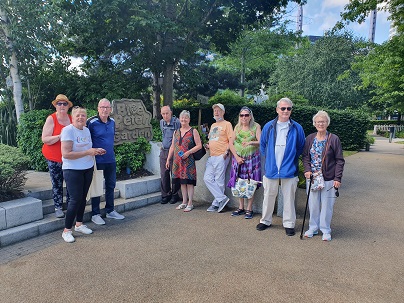
Phase 0: Participatory planning phase
We engaged with older people, support organisations and various groups and projects to plan each project stage. We did this through 8 participatory and co-design workshops, which have reached over 100 older people. This included sessions with the Salford Older Peoples Network and Salford’s International Day of Older People Celebration Event. These sessions have provided us with wider scope to have conversations with people, especially those who are not digitally connected and whose voices are seldom heard.
During this phase we also worked with key community stakeholders to map current provision and activities across the city and run participatory/co-design sessions. As part of this initial participatory planning phase, over 100 community activities and services that engage older people have been mapped across the city.
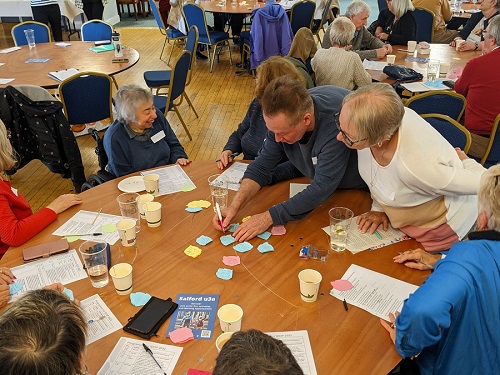
Phase 1: Stakeholder Engagement
These sessions have gathered insight into the provision of existing support and engagement activities at a distance, identify barriers and enablers, and are used to identify examples of good practice.
This session has now been completed, and the data was collected across 11 sessions, comprised of 9 focus groups and two interviews with 37 individuals from 10 organisations.
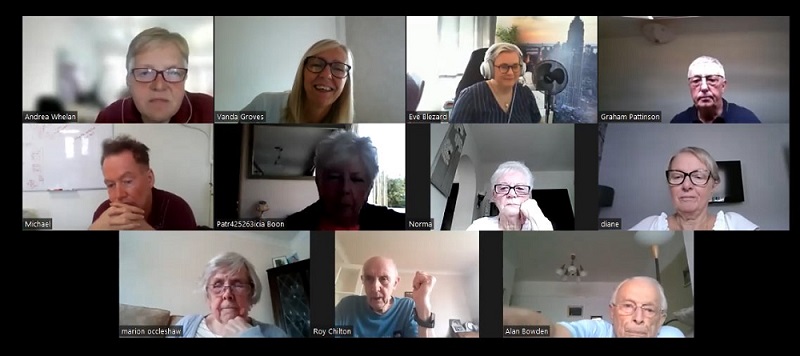
The data reveals a multifaceted picture of ageing post-pandemic in the UK. Although there has been a formal end of lockdown restrictions, this is not the end of people’s experiences and concerns; some older people are still self-defining as vulnerable with an ongoing impact affecting what they feel is less or riskier to engage in. The provision of support services continues to be affected in terms of older people’s confidence to return and the availability of suitable spaces, services and resources. Due to restrictions in indoor spaces, there has been a re-discovery of outdoor and green places, the use of which continues beyond lockdown. There is also evidence of adaptability by rapidly engaging with new technology. Whilst regular online activities are continued and appreciated by those who can attend them, the digital exclusion of older people remains of concern.
Phase 1: Report and Findings
We have now completed our analysis from Phase 1 and you can read the summary report of our project findings. This report gives you an overview of the findings to date.
The project team would like to extend thanks to the service providers and organisations who took the time to speak about their experiences. The project team would also like to the Dunhill Medical Trust for funding the work as part of its Building and Developing Suitable and Sustainable Living Environments and Communities for an Ageing Population.
There is a fuller report that can also be accessed if you would like to read about the findings in more detail and printed copies are also available on request, further details about the work is available by emailing a.clark@salford.ac.uk or writing to Prof Andrew Clark School of Health & Society, University of Salford, Salford. M5 4WT. This work is conducted in partnership with Inspiring Communities, Age UK Salford and the Age Friendly Salford network. For more information contact contact Bernadette Elder at bernadette@inspiringcommunitiestogether.co.uk or telephone 0161 743 3625.
Phase 2: Elicitation Interviews
We have now concluded our interviews and have completed a total of 40 elicitation interviews with 44 participants. These interviews with older people from right across the Salford City Region have provided insight into experiences of connecting with people, places and support. These were concluded at the end of June 2023 and we are now working on the analysis and findings from these interviews, this will take some time but we will be producing some reports and presentations of our findings, in the meantime you can learn more about our interviews from our Research Fellow Eve Blezard in this video.
As part of our participatory action research design we are conducting walking interviews, where we go for a walk around local neighbourhoods. During these interviews we are asking people about where they like to go and what you enjoy in your neighbourhood. We sometimes take photographs during the walk, you can stay updated with where we have been across the City by following our twitter feed.


Phase 2: Photo Voice Project
We are supporting a Voice & Influence group of 8 older people to work with us on a bespoke community research project using photo-voice and film to record older people’s lived experiences. The group will also work with the project team to host a series of ‘Conversations about Ageing’ with service providers, policy makers and other older people.
The first session was held in early May 2023 and began by gaining insight into the impact of Covid-19 on older peoples social connections. Age Friendly Salford co-delivered the session with a group of older people to explore the topic of ‘places and spaces that matter to me’.
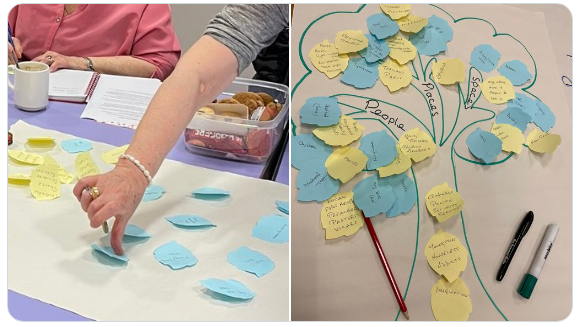
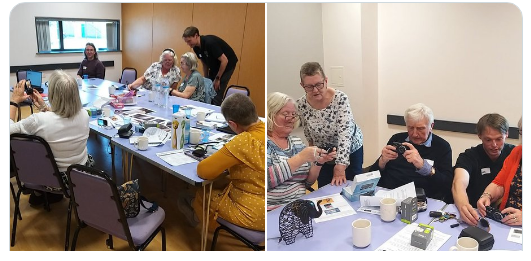
Phase 3: An update on our Voice and Influence Photovoice work
Who are we?
We are a team of Salford residents, staff from the community and voluntary sector, and university researchers who came together to complete a research project exploring the legacy of the Covid-19 pandemic on older people. We received funding to do this from the Dunhill Medical Trust. This was supplemented with further support from the Economic and Social Research Council Festival of Social Science fund.
What did we want to achieve?
The Covid-19 pandemic profoundly impacted everyone, disrupting daily routines, and challenging what we once took for granted. This is particularly so for older people who it has been reported were disproportionately negatively affected by the disease and the restrictions imposed to limit its risks. For instance, some reported reduced physical activity and others were at risk of increased isolation. We wanted to know the longer-term impact of the pandemic on older people in particular, including its impact on how they remained connected to the people they know and the places where they live. By understanding this, we aim to contribute to the development of age-friendly initiatives to better support people to live in their communities and neighbourhoods.
The work has been undertaken in Salford (Greater Manchester) where, alongside data collection undertaken by the team of academics, people from Salford have been involved in a photo-voice inspired project to document their lives.
How did we achieve it?
The project ran over 12 weeks and was supported by 8 regular participants. We supported the group to learn skills in photography and considered the ethics of the project and developed guidance on taking photographs. The group then used photography and other creative methods including digital images, Polaroid images, a video, coffee table book, and booklet as a platform for sharing their individual experiences to help us understand the impact of Covid-19 on the lives of older people in Salford.
The participants used their new photography skills to take photos to create a community reporter story about the people, places and spaces that matter to them. They also co-designed a collage of images to explain what has returned, what has been lost and what is new. Through these and other creative methods we were able to identify the collective insights emerging from the individual experiences and create a collective story of life since the pandemic.
What has been the outcome?
The work tells a story of what matters to us as older people in Salford. These themes highlighted the need to have a role, connect, and contribute within the community. Have access to outdoor green and blue spaces, the increased awareness and realisation of the importance of good mental health, and access to Age-Friendly places making the neighbourhood more accessible, including convenient – affordable – accessible shops. Post covid priorities have changed, shifting from running a home to connecting locally with people in their neighbourhood.
The findings will form part of the final evaluation report, which will help service providers and wider stakeholders to reflect on these messages and review their own delivery of services and activities within neighbourhoods.
What are the new skills and benefits gained from their involvement?
The group have learnt a number of new skills through the project:
- Understanding why photography is a good tool for telling stories;
Learning how to take a photo, send, and delete on the digital camera; - Understanding and applying ethical principles that underpin the project;
- Gaining portraiture skills;
- Understanding how a picture can tell a story;
- Photography skills;
- Thinking as a collective;
- Understanding the collective story regarding what matters to the group now;
- Learning what a cyanotype is;
- Learning how to create a collage of images using cyanotype and other images;
- And preparing and displaying items for an exhibition.
A short booklet about our work is available by email from Vanda Groves at VandaGroves@ageuksalford.org.uk
Latest update
The project came to an end in September 2024. A Final Project Report and Executive Summary are now available.
The project team would like to thank everyone who generously gave their time to to support the project by advising us, supporting or participating in the Voice and Influence group, or sharing their stories as part of the research. We are now sharing our findings with others, and some of the recommendations are being taken forward by our partners Age Friendly Salford and Inspiring Communities Together.